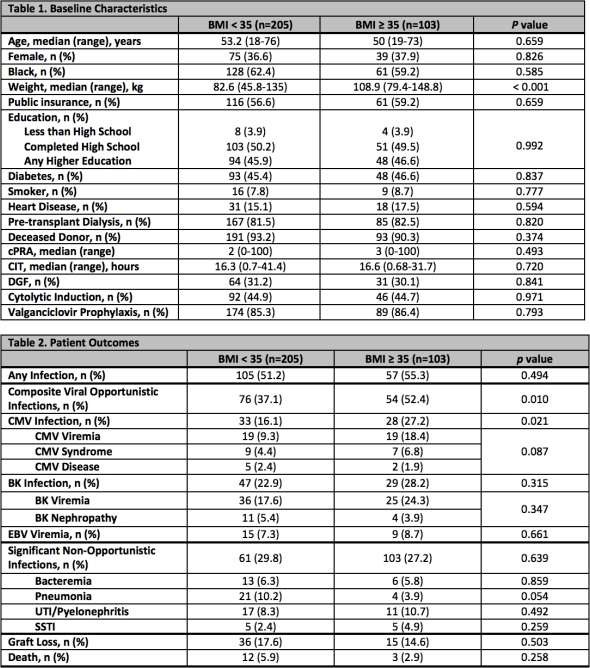Do Morbidly Obese Patients Have an Increased Risk of Infection Post-Kidney Transplant?
Medical University of South Carolina, Charleston, SC.
Meeting: 2016 American Transplant Congress
Abstract number: A254
Keywords: Cytomeglovirus, Infection, Kidney transplantation, Obesity
Session Information
Session Name: Poster Session A: Poster Session III: Kidney Complications-Other
Session Type: Poster Session
Date: Saturday, June 11, 2016
Session Time: 5:30pm-7:30pm
 Presentation Time: 5:30pm-7:30pm
Presentation Time: 5:30pm-7:30pm
Location: Halls C&D
Purpose: Obesity has been associated with significant morbidity in the kidney transplant population. The aim of this study was to assess the impact of obesity on risk for development of opportunistic viral infections and other significant infections after kidney transplantation.
Methods: This was a propensity score matched (PSM) retrospective longitudinal cohort study of renal recipients transplanted between January 2010 and December 2014. Pediatrics and multi-organ transplants were excluded from the study. A total of 818 transplants were screened for inclusion in the study; patients were then matched 2:1 using PSM based on age, race, deceased donor transplant, level of education, gender, insurance, cold ischemic time, cytolytic induction, smoker, and heart disease. PSM was conducted using a greedy match macro, without replacement, caliper set at 0.2. Viral opportunistic infections were defined as any level of cytomegalovirus, BK, parvovirus, adenovirus, or Epstein Barr viremia. Significant non-opportunistic infections were defined as any non-opportunistic infection requiring or prolonging hospital admission for treatment.
Results: A total of 308 patients were included in the PSM cohort; baseline characteristics were similar between the groups (Table 1). The incidence of opportunistic viral infections was significantly higher for patients with a BMI of ≥ 35 kg/m2. The rate of CMV infection was significantly higher in the morbidly obese group; however, the rate of BK infections and EBV infections were similar. Significant non-opportunistic infections and long term graft and patient survival were not different for obese patients (Table 2).

Conclusions: This analysis demonstrates that morbidly obese (BMI ≥ 35 kg/m2) patients are more likely to experience viral opportunistic infections; however, severity does not appear different between groups.
CITATION INFORMATION: Strout S, Pilch N, Veasey T, Miller R, Fleming J, Meadows H, Mardis C, Mardis B, Baliga P, Posadas A, McGillicuddy J, Taber D. Do Morbidly Obese Patients Have an Increased Risk of Infection Post-Kidney Transplant? Am J Transplant. 2016;16 (suppl 3).
To cite this abstract in AMA style:
Strout S, Pilch N, Veasey T, Miller R, Fleming J, Meadows H, Mardis C, Mardis B, Baliga P, Posadas A, McGillicuddy J, Taber D. Do Morbidly Obese Patients Have an Increased Risk of Infection Post-Kidney Transplant? [abstract]. Am J Transplant. 2016; 16 (suppl 3). https://atcmeetingabstracts.com/abstract/do-morbidly-obese-patients-have-an-increased-risk-of-infection-post-kidney-transplant/. Accessed February 18, 2026.« Back to 2016 American Transplant Congress
